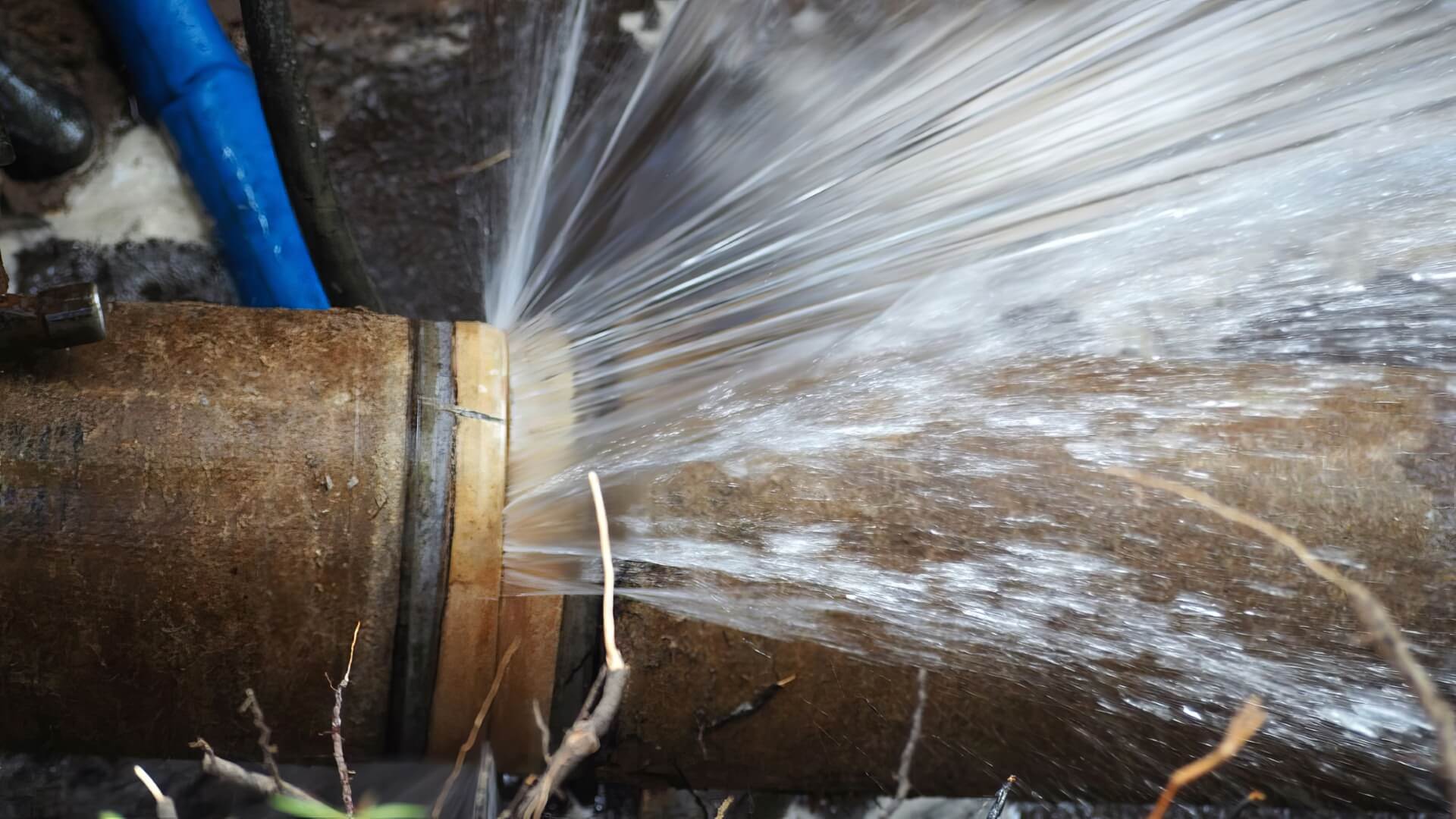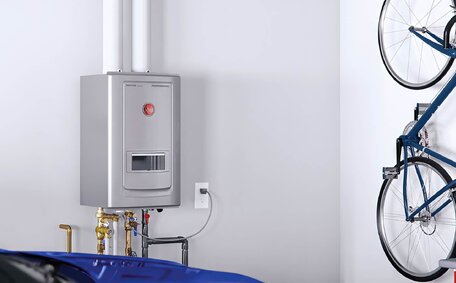Introduction to tankless water heaters
Tankless hot water systems provide hot water on demand, eliminating the need for a storage tank and the associated energy losses of reheating water, unlike traditional storage tank heaters.
Tankless operation heats water instantly when needed, thus providing a continuous supply without the delay of heating a storage tank.
Large families with substantial hot water requirements find tankless heaters advantageous, providing ample hot water to meet all their needs.
The efficiency of tankless systems and their ability to handle several water outlets at once make them a compelling choice over conventional water heaters with storage tanks. Choosing the correct size for your tankless unit guarantees a steady hot water supply, even when your household experiences the highest demand.
In this informative guide from the trusted professionals at Quakers Hill Plumbing, we’ll explore how tankless water heaters work, sizing considerations for larger homes, installation factors, and the key benefits tankless systems can provide over traditional storage tank heaters.
Whether you’re considering a new hot water system or specifically electric models, we aim to offer unbiased insights to help homeowners determine if going tankless is the right solution to fulfil their family’s hot water needs.
How tankless water heaters work
Tankless water heaters rapidly elevate water temperature using burners or heating elements as water flows directly through the system, bypassing the need for a storage tank.
This provides instant hot water, ensuring a constant supply on demand.
Tankless heaters provide hot water when activated, thereby eliminating the standby heat losses seen in systems that maintain a reservoir of hot water.
Tankless heaters monitor the flow rate of water passing through the unit, ensuring the system can provide continuous hot water. This makes tankless heaters ideal for a large family with high hot water usage.
When a hot water tap is opened, the flow sensor signals the heat pump water heating elements to commence operation in your gas hot water system. The incoming water is rapidly heated to the target outlet temperature, ensuring the gas hot system efficiently heats water, providing a constant supply at your taps.
Gas-fuelled tankless systems effectively transfer heat to water, whereas electric models rely on heating coils, both ensuring an endless supply with adequate flow rates and power.
Understanding peak demand for hot water
Peak demand, particularly for any water heater system, refers to the maximum amount of hot water required in a home during a specific period of time when usage is at its highest. For a big family, calculating peak demand is essential in making certain your tankless water heater can meet your household’s instantaneous hot water needs.
Peak demand is determined by the number of people in a home and coinciding hot water usage - like when multiple family members shower, run taps, or use appliances at the same time.
As a general rule, you would need about 3 gallons (11 litres) per minute of hot water for each showerhead operating at once. Add approximately 0.5 gpm (1.9 lpm) for each sink being used concurrently.
Assess your tankless heater’s capacity by calculating the peak demand, which is the sum of all simultaneous hot water uses in your home.
Consider a family of eight with four showers and two sinks used simultaneously, requiring a total flow rate of 53 litres per minute.
Understanding your peak demand ensures your gas hot water heater provides sufficient flow even during periods of heavy usage. This prevents frustration over lukewarm showers or sinks when your family needs hot water most. Contact our team - we can help you determine the right tankless heater to meet your household’s unique demands.
Sizing tankless units for large households
When it comes to sizing a tankless water heater for a large household, proper calculations are crucial. Tankless heaters are rated by their maximum flow rate at a given temperature rise.
For instance, selecting an electric unit requires one with a 6 GPM (23 LPM) capacity at a 75°F (42°C) rise, capable of heating water from 10°C to 52°C at a flow rate of 23 LPM.
Choose a tankless heater that meets your peak demand by calculating the total flow rate needed during simultaneous use in your household.
For a very large household, a water heater large enough may require multiple tankless units to meet the demand. This is where trained professionals like Quakers Hill Plumbing can help design a custom system using multiple gas tankless water units working in unison to supply your home with endless hot water.
Correctly sizing the water heater your home requires is vital to reap the benefits these storage systems offer. Our experienced team conducts thorough home assessments to identify the perfect tankless water heating solution, catering to your family’s current and future needs.
Optimizing tankless water heater performance
Regular maintenance and water treatment are vital for optimising the energy performance of a tankless heater in a large home.
Hard water can cause scale buildup in tankless heaters, reducing efficiency. Fitting a water softener can prevent this and maintain optimal performance.
It’s also important to flush the heat exchanger annually to clear any buildup. Regular maintenance, including descaling, ensures your tankless unit can last, operating at peak efficiency for years. Check and replace the water filter regularly as well.
Work with a professional like Quakers Hill Plumbing to adjust your tankless unit’s flow rate settings if needed. Fine-tuning flow rates ensures the heater activates appropriately based on your home’s hot water demand patterns.
With proper maintenance to prevent scale buildup, tankless heaters ensure a continuous flow of hot water is available when needed, making your system reliable, satisfying even extensive family requirements.
Recirculating systems to reduce wait times
For large families, one downside of tankless water heaters can be the time it takes for hot water to reach distant faucets and showerheads after turning on the tap. This delay results from cooled water that has been stationary in the plumbing. Recirculating systems can help reduce wait times by keeping water moving.
A recirculating pump cycles water from the tankless heater throughout the home’s plumbing, maintaining a continuous loop. The cooled water sitting in pipes gets pushed back to the heater to reheat. This keeps hot water circulating throughout the plumbing system.
A recirculating system delivers hot water faster, reducing the wait time for cool water in the pipes to clear, which is particularly convenient for large homes.
Recirculating systems involve added complexity and energy use, so aren’t always cost-effective. But in some large homes, the convenience can outweigh the costs. Consult with the experts at Quakers Hill Plumbing to determine if a recirculating system makes sense for delivering hot water quickly to your household.
Installing tankless heaters in your home
When comes to setting up tankless water heaters in Quakers Hill homes, professional installation is highly recommended. While tankless heaters may seem straightforward, there are some important considerations our licenced plumbers at Quakers Hill Plumbing take into account.
Tankless units require proper sizing and location to efficiently heat up water.
Our team performs on-site evaluations to determine the optimal model and placement to meet the hot water demands of the system your household operates, accounting for water pressure and existing plumbing. We’ll also advise you on any necessary electrical upgrades to ensure your electric hot water systems are right for your home or gas line resizing for gas models.
Another factor is ventilation. Tankless heaters produce exhaust gases that need to be vented outdoors, so we can also determine the best venting configuration and terminate the venting properly. Proper ventilation is critical for safe operation.
Our plumbers also handle the challenging water and gas connections that gas water heaters, with or without a heat pump, require. And we can integrate your new tankless water heater with recirculating systems if needed. Installing isolation valves is also recommended for easier future maintenance.
Quakers Hill Plumbing will ensure your tankless installation meets all applicable Australian standards and local regulations. We handle any required permits and paperwork as well.
Professional installation ensures your tankless water heater is set up safely and effectively; contact our expert team for assistance.
Energy efficiency and cost savings
Tankless water heaters are significantly more energy efficient than conventional storage tank systems. This efficiency advantage stems from tankless heaters’ on-demand operation, eliminating the standby heat losses associated with heating and re-heating water your tank would store.
Research indicates that tankless heaters can lower electricity usage for water heating by at least 20-30% compared to traditional tank heaters. These energy-efficient models can lead to cost savings with lower energy bills, frequently offering a return on investment within a few years.
For high-usage homes concerned about energy expenses, tankless heaters offer greater savings by heating water only when required.
Beyond cost savings, the eco-friendly nature of solar hot water systems and tankless heaters, compared to a traditional storage system, appeals to Australian families eager to reduce their carbon footprint. Their exceptional efficiency means lower greenhouse gas emissions from water heating.
Get in touch with Quakers Hill Plumbing for insights into energy and cost savings achievable with tankless water heaters. We can advise you on selecting the right tankless model to maximise efficiency gains and payback for your household’s specific hot water requirements.
Comparing tankless to conventional water heaters
Tankless heaters supply hot water on demand and are highly energy-efficient, but they require a higher upfront investment and possible infrastructure upgrades.
Conventional hot water tanks are more affordable upfront, yet may be insufficient for heavy use and can incur higher running costs due to continuous heating.
Tankless heaters are more space-efficient and can save 20-30% on energy compared to tank models, though installation and potential upgrades add to the initial cost.
For large households with high hot water demands, tankless heaters make sense thanks to their endless hot water supply and superior efficiency if sized correctly. But conventional tank heaters may suit those on tight budgets or with average usage.
Quakers Hill Plumbing offers personalised consultations to discuss the benefits and limitations of tankless systems, ensuring a fit for your home’s requirements. Get in touch to determine whether a tankless or conventional water heater is the optimal solution for heating water efficiently.
Are tankless systems right for your family?
Large families should consider peak demand, energy expenses, and maintenance ease when deciding on a tankless hot water system.
Our professionals will help you compare your hot water needs and budget to determine whether a tankless or traditional system is right for you.






